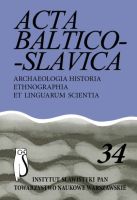Kategoria swój – obcy w antroponimii lokalnej na przykładzie nazwisk mieszkańców Wysokiego Mazowieckiego
A homely–stranger category in local anthroponomy. On the example of surnames of Wysokie Mazowieckie inhabitants
Author(s): Dorota Krystyna RembiszewskaSubject(s): Language and Literature Studies
Published by: Instytut Slawistyki Polskiej Akademii Nauk
Keywords: homely–stranger category; linguistics; science of names; anthroponomy; Podlasie
Summary/Abstract: The aim of the article is showing the homely–stranger category in relation with local anthroponomy on the example of surnames of inhabitants of a town in Podlasie. The opposition mentioned above is shown as one of basic categories which describe the culture of local community. The role of surname geography in establishing the homely–stranger relation was discussed. Moreover, review of surnames’ interpretations in onomastic surveys was presented. In the discussion of the homely–stranger category with reference to anthroponyms of inhabitants of Wysokie Mazowieckie indicators of homeliness were taken into consideration: local (toponymic surnames with the -ski formant), familiar (surnames formed from native appellatives and patronymic), recognized, accepted (surnames which contain foreign elements or unknown dialectal appellatives whose holders are well known to the community or there is a large representation of them). Among the indicators of strangeness there are elements: foreign (anthroponyms with non-Polish formants, e.g. -uk, foreign surnames which have a small representation of holders), unknown (anthroponyms formed from non-Polish appellatives or from appellatives of archaic character), different (surnames with non-Polish phonetic features). The discussion of understanding particular surnames by micro community shows again what important role a stereotype plays both on linguistic and cultural ground. Presented analysis shows inclination of a given group to attributing certain features to particular surnames. These features result from knowledge and imagining of particular members of a community and most often are not connected with knowledge of morphological structure or an anthroponym’s etymology. Therefore they disaccord with linguistic interpretation.
Journal: Acta Baltico Slavica
- Issue Year: 2010
- Issue No: 34
- Page Range: 169-184
- Page Count: 16
- Language: Polish

